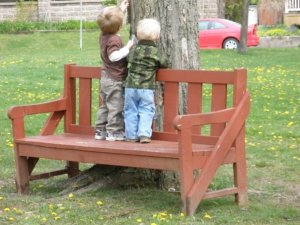I heard once that the a sociopath is someone who is born without empathy while a psychopath is someone who uses empathy to his/her advantage. In one of my university social work class there was an intense argument about nature versus nurture – Is empathy innate or learned? As I recall, I took the innate side of the argument then but I’ve since changed my tune. I believe that empathy can and should be taught starting at a young age.

Baby Ben and my nanny Carol (Carol is disabled from a brain aneurysm and mostly non-verbal)
©PicklesINK 2012
The Oxford Dictionary defines empathy as, “the ability to understand and share the feelings of another,” and Wikipedia notes, “One may need to have a certain amount of empathy before being able to experience compassion.” I think of empathy as the ability to recognize how another person feels and compassion as the drive help them feel better. Both empathy and compassion have been important parts of my life and I feel that they are two of the most crucial interpersonal skills I can pass on to my children.

Photo of two boys standing on a bench looking at a tree
©PicklesINK 2012
I have a lovely friend who is a much more of an attachment-parenting, Dr. Sears-reading type than I am, and I remember on one of our earliest playdates thinking, “Wow, she’s got it so together – she talks to her kids about their feelings when they misbehave and never raises her voice with them!” As it turns out, at this same time, she was looking at me and thinking, “Wow, she’s got it so together! She doesn’t mess around when her kids misbehave and they listen to her when she uses her ‘mommy’ voice!”
One of the things I learned from this friend and incorporated into my own parenting style was the use of the word “kind” when I praise my kids. There is an awful lot out there about the pros and cons of praising your children (read for yourself: I just Googled “pros and cons of praising children” and it’s like a table-tennis match – “Praise your children!” “Don’t praise your children!” “Dos and don’ts of praising your children” “Are we setting our children up to fail?” etc.). I disagree with the extremes on either side (perhaps the parents who chant, “WOW GOOD JOB!!” 18,000 times a day and the people who read and write articles accusing those good-jobbers of manipulating their children and creating “praise junkies” should be locked in a giant arena to fight it out so the rest of us can get on with life).
The middle ground is:
- Yes, we do use praise to “manipulate” our kids. It is one of the tools that we have to teach our kids to act appropriately and be productive members of society.
- True, too much empty praise sets kids up for disappointment (“But mommy, you told me I was a great hockey player and I DIDN”T EVEN SCORE A SINGLE GOAL!!”).
- Praise is the most effective when it is specific and descriptive (but sometimes we parents are busy and distracted and the odd, “Good job!” never hurt anyone).
I was thinking recently about how I use the word “kind” and I realized that the reason it appeals to me is that it fits that third criterion as it is much more specific and descriptive than the usual “nice.” “Nice” is something you just happen to be whereas “kind” describes a choice that you have made to make another person feel good. When I use it I usually pair it with a description of the other person’s emotions – “It was so kind of you to share your cookie with Molly, Ben. Look how happy that made her!” or conversely, “Oh dear, Molly – that was not very kind. Look how sad Ben is because you snatched his toy.”
A tool that I use (that this friend admits borrowing from me in return!) is that when someone has been hurt, I ask Ben and Molly to apologize and then to ask the injured party, “Are you okay?” and if the answer is “No,” to ask, “What can I do to help?”

Papa lends baby Ben a helping hand climbing up
©PicklesINK 2012
There is a lovely program called Seeds of Empathy that has been in place at Ben and Molly’s school for many years (you may also have heard of its older sibling, Roots of Empathy, which works with school-aged children). These programs introduce a baby to a classroom as a “Teacher” to foster empathy and compassion in the children over the course of the program year. A trained “Family Guide” helps the children to observe the baby’s development and label his or her feelings.

Cuddles for Ben and baby Molly
©PicklesINK 2012
The other day, Ben shared one of those everyday 5 year-old boy heartaches that makes my inner mama-bear rear up on her hind legs and start pawing the air the: “Mommy, Daniel* called me a baby. He said that Diego is a baby show and I shouldn’t watch it because that makes me a baby…and that made me feel little and I don’t like feeling little.” He paused for a few seconds and then added, “But then Joey whispered in my ear, ‘I think you’re really big.'”

Photo of polar bear
©PicklesINK 2012
This mama bear wants to find Joey, his parents, and the Seeds of Empathy creators, buy them several bottles of wine, and dole out hugs all around, because empathy and compassion are clearly thriving in that classroom!
The outcome of all this so far is that although their impulse control (or lack thereof) frequently gets the better of them, if either Ben or Molly does something that upsets the other they’re often comforting each other before I have a chance to say, “What happened, guys?” – which in turn makes me feel pretty good!
~ karyn
* Names have been changed.
Well written Karyn. I agree with your position on the “balanced approach” to parenting. In a world where childrens life experiences are so lilmited, parents seem to either “over care” or not care at all. Many times I have condsidered writing a book on this exact controversy, yet is that what we need, another book to tell us what we should or shouldn’t be doing with our children. I contemplate the idea (if I did write a book) calling it “Parenting from the heart”.
Heheheh…I guess some of my child studies education is paying off after all! It seems like the pendulum keeps swinging back and forth; in my life from the independent “latch-key” kid of the 80’s to the helicopter parents of the millennium. I know I have to talk myself down from rushing in every time Ben or Molly has a problem, but they seem to work it out faster and more effectively on their own. Seems like that happens in his classroom too – they must have the best teachers at that school! =)
My cousin participated in Roots of Empathy with her first baby.
I would have loved to but my babies just weren’t born at the right time of year!
Pingback: I’m sorry, but I believe in “sorry!” « picklesink
It is so important for our kids to learn compassion. What a lovely story about Ben and his school mate, what a wonderful thing.
Thanks so much – I was so proud of both of them when he told me about it!
What a fantastic post ~ I believe that it is absolutely necessary to teach kids about compassion and empathy.
Thank you for linking to Raising Imperfection.
Please come back Friday to see if you were featured.
¤´¨)
¸.•*´
(¸¤ Lanaya | xoxo
http://www.raising-reagan.com
Thanks a lot! I’m glad I stumbled on your Linky!
So glad to have you!! Please be sure and check back Friday as we feature our favorites!!
This gave me lots to think about. It sounds like that program is fabulous and I love the idea of teaching empathy to kids.
Thanks!! The program is wonderful – I think the kids get so much out of it!
I love this post! I have taken a middle road in my parenting style, being very influenced by the book Between Parent and Child. I started using feeling words before my kids could talk and yet I”m always amazed when they say, Mommy, I feel ….,. I love how your son told you about his friend, and I love the way they worked it out with each other. I also find praise works when it’s real. I hated being told I did “great” when I knew I didn’t. Your kids are so lucky to have such a caring and dare I say, kind, mother!!
Aww, thanks!! I’m going to have to check out that book!
Pingback: It only takes a spark | PicklesINK